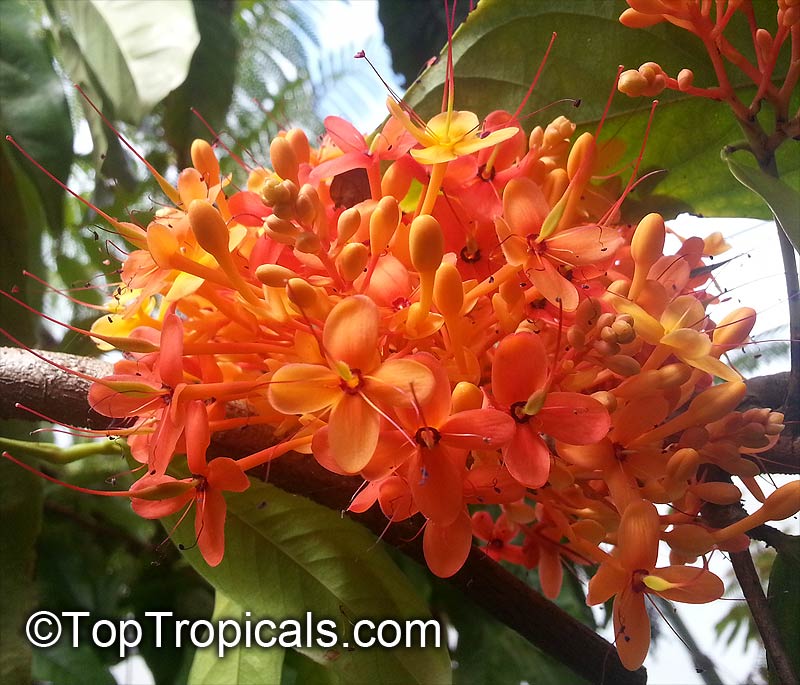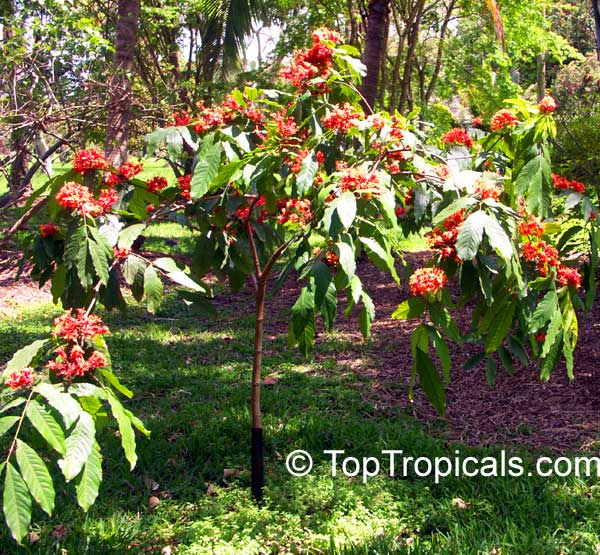The tree of Happiness - Ashoka. Saraca indica, the Sorrowless Tree
by Onika Amell
About the Author
Onika Amell was born in farmer's family in Cape Town, South Africa, and always had a keen interest in gardening. She has been a globe-trotter for many years, traveling along with her husband, an engineer, and her life is worth a novel. In Cape Town she worked in groups “Soil for Life and Work for Love”, teaching people how to grow their own food, improve their health, and protect the environment. Onika lived in Galilee, Israel, skydiving over 500 jumps and working on the fields planting, harvesting and caring for various crops (Lychee, Avocado, Bananas, etc), helping out in community gardens... In SE Asia, she taught English at business centers... Upon finally settling in SW Florida, she joined the ECHO Global Farms project on teaching farmers/families around the world about effective crop production... Now as a part of Top Tropicals Team, Onika is our plant expert and a columnist. Onika's biggest passions are plants and... of course – cats, who are her children! She has six of them: Itembi, Freddie Mercury, Donald Trump (he is the difficult one), Tigerlilly, Sweetie, and Jaxson.
Q: I have recently visited India and saw the most beautiful Ashoka trees at the entrance to a temple. The flowers were simply show stopping, growing directly on the trunk and branches. I would love to grow one. I have been told it has significant medicinal properties. I am delighted to see you have them in your inventory. And they are on sale too! Are they easy to grow?
A: Ashoka or Saraca indica is one of the most exotic flowering trees of the Indian subcontinent. What an interesting conversation piece to have in a garden!
Buddhists, Jains and Hindus all hold this tree in extremely high esteem and it is considered a sacred tree. Ashoka is mostly worshipped in the Chaitra month of the Hindu calendar and many local traditions and folklore are connected to this stunning tree. The tree is dedicated to Kama Deva, the god of love. It is also believed that Queen Maya gave birth to Buddha under an Ashoka tree in the XI century BC.
Ashoka is extremely highly valued for nutritional value as well as its beautiful appearance. No surprise then that they are often found in royal palace grounds and gardens as well as around temples throughout India. Ashoka is evergreen with wide spreading branches which creates an almost a weeping appearance with a dense crown of leaves. Young leaves are a stunning deep pink color and emerge at the end of branches like hanging tassels. This tree will typically grow to around 20 feet and is a brilliant bloomer. It will wow you with large, round clusters of fragrant flowers throughout the year.
Flowers appear directly on the trunk and main branches as opposed to stems. Profuse flowering occurs in January and February with a floral display so beautiful, it will stop anyone it their tracks.
The flowers look similar to the flowers of Ixora but display a lot of different colors. Young flowers are yellow which later turn into hues of orange and then finally transform into a beautiful crimson red. They also give off a sweet fragrance, especially at night. Without a doubt it is one of the most stunning Indian flowering trees.
Almost all parts of this tree are widely used for different medicinal purposes as essential nutrients are derived from it. These contain tannins, glycoside, essential oils and calcium as well as carbonic compounds of carbon and iron while the bark of the tree contains ketosterol. It treats acne, gynecological problems, improves skin complexion, prevents internal bleeding, treats diabetes and piles, prevents diarrhea, removes kidney stones and treats asthma, has analgesic properties and deals with bloating and inflammation. The pulp of flowers is also used to treat dysentery. It reportedly even helps to improve intellect! Simply amazing.
Though all parts of the Ashoka tree are safe to use, we always want to encourage you to seek advice from a medical professional before using any plant medicinally.
Ashoka trees can be grown easily in warm and humid climates. It prefers a well-drained and organic soil in a full sun location. Water regularly but take care not to over water.
The name Ashoka means painless, without sorrow, no grief in Sanskrit. What are you waiting for? Grow your very own happiness! Your sacred Ashoka is waiting for you.


